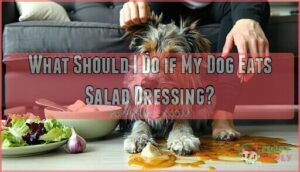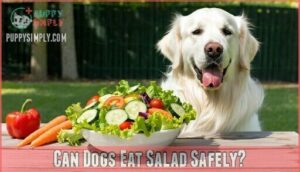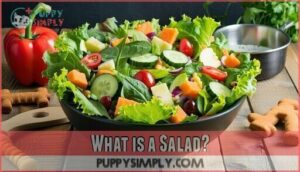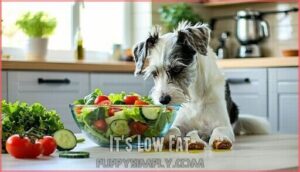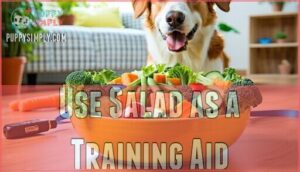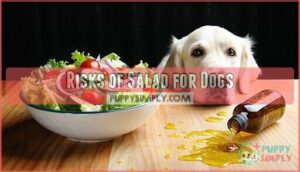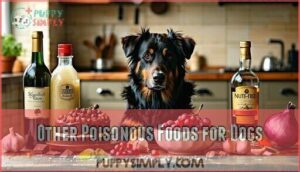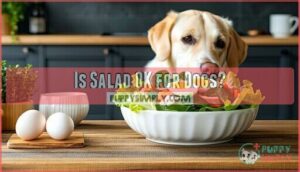This site is supported by our readers. We may earn a commission, at no cost to you, if you purchase through links.
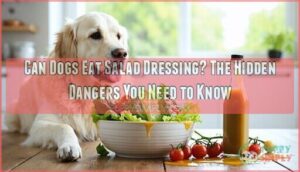 You shouldn’t let your dog eat salad dressing. Most dressings contain ingredients that can harm dogs, like garlic, onions, or high levels of fat and sodium.
You shouldn’t let your dog eat salad dressing. Most dressings contain ingredients that can harm dogs, like garlic, onions, or high levels of fat and sodium.
Creamy varieties such as ranch, Caesar, and blue cheese are particularly problematic since they’re loaded with fat that can trigger pancreatitis – a serious condition requiring immediate veterinary care.
Even "healthier" vinaigrettes often contain garlic or onion powder, both toxic to dogs. If your pup accidentally licks some dressing, don’t panic, but monitor them closely for symptoms like vomiting or lethargy.
The good news? There are safer ways to share your love of fresh greens with your furry friend.
Table Of Contents
- Key Takeaways
- Why is Salad Dressing Bad for Dogs?
- What Should I Do if My Dog Eats Salad Dressing?
- Can Dogs Eat Salad Safely?
- What is a Salad?
- Health Benefits of Salad for Dogs
- Risks of Salad for Dogs
- How Much Salad Can a Dog Eat?
- My Dogs Ate Salad, What Should I Do?
- Other Poisonous Foods for Dogs
- Is Salad OK for Dogs?
- Up Next
- Frequently Asked Questions (FAQs)
- What salad dressing is safe for dogs?
- Can dogs have ranch salad dressing?
- Can dogs eat Italian salad dressing?
- Is there a safe alternative to salad dressing for dogs?
- What are the signs of onion and garlic toxicity in dogs?
- Are all types of salad dressing bad for dogs?
- Are there any health benefits to feeding my dog salad?
- Can I train my dog not to eat people food?
- What happens if dogs eat ranch dressing?
- Are homemade salad dressings safer for dogs?
- Conclusion
Key Takeaways
- Never give your dog salad dressing – Most contain toxic ingredients like garlic, onions, or high fat content that can cause pancreatitis or poisoning
- Watch for symptoms if they accidentally consume any – Monitor for vomiting, diarrhea, lethargy, or weakness and contact your vet immediately if these occur
- Plain salad greens are actually safe and healthy – Lettuce, spinach, and carrots provide vitamins and fiber when served without any dressing or seasoning
- Create dog-safe alternatives if you want to share – Use plain olive oil, coconut oil, or unsweetened Greek yogurt instead of commercial dressings
Why is Salad Dressing Bad for Dogs?
Underneath the innocent-looking bottles in your refrigerator door lurk some serious hazards for your furry friend.
Salad dressing bad for dogs stems from several harmful ingredients that can turn a small taste into a veterinary emergency.
The fat content in most dressings poses the biggest threat.
These high-fat concoctions can trigger pancreatitis, a painful and potentially life-threatening condition where your dog’s pancreas becomes inflamed.
Even a few licks can cause gastrointestinal upset, leading to vomiting and diarrhea.
Toxic seasonings make matters worse.
Garlic and onion powder, common in many dressings, damage your dog’s red blood cells.
Meanwhile, excessive salt can cause salt poisoning, leading to dehydration and kidney problems.
The toxic ingredients don’t stop there.
Artificial sweeteners, preservatives, and acidic vinegars can all spell trouble.
Your dog’s digestive system simply wasn’t designed to handle these processed concoctions that we humans enjoy on our salads.
What Should I Do if My Dog Eats Salad Dressing?
When your dog accidentally gets into salad dressing, stay calm and monitor symptoms closely.
Check the ingredients first—toxic elements like garlic, onions, or xylitol require immediate vet consultation.
Watch for gastrointestinal upset, including vomiting and diarrhea, over the next 24 hours.
Your veterinarian might recommend inducing vomiting if ingestion was recent, or activated charcoal for severe cases.
As preventative measures, store dressings securely and teach "leave it" commands to avoid future incidents.
Can Dogs Eat Salad Safely?
Yes, dogs can safely enjoy salads when you choose safe salad ingredients carefully.
Skip toxic ingredients like onions and garlic completely. Plain leafy greens, carrots, and cucumbers make excellent dressing alternatives.
Practice portion control – treats shouldn’t exceed 10% of their diet. Nutritional benefits include vitamins and fiber.
Lettuce offers hydration due to its high water content. Create simple homemade dressings using plain yogurt or olive oil.
Always verify ingredients are dog-safe before serving.
What is a Salad?
Before we explore salad’s nutritional perks for your pup, let’s clarify what actually counts as salad.
Salad Components typically include leafy greens, vegetables, and fruits mixed together.
Throughout Salad History, these combinations have evolved into countless Salad Variations—from simple garden mixes to complex gourmet creations.
Different Salad Types offer varying Salad Nutrition profiles.
However, the real concern isn’t the salad itself but what you put on it.
While plain vegetables provide vitamins and fiber, salad dressing containing oil, vinegar, and other ingredients can pose serious risks.
Dogs can safely enjoy many plain salad components, but seasoned or dressed versions require careful consideration of every ingredient.
Many leafy greens offer benefits, and romaine lettuce is safe for canine consumption.
Health Benefits of Salad for Dogs
While salad dressing poses risks to dogs, plain salads themselves can offer several health benefits when prepared safely.
You’ll want to focus on dog-safe ingredients that provide nutrition without the dangerous additives found in most commercial dressings.
It’s Low Fat
Salads pack plenty of nutrition without the excess fat content found in many dog treats.
When you’re watching your pup’s weight, these leafy greens offer a smart alternative that won’t contribute to obesity or unwanted weight gain.
The key lies in portion control and choosing safe ingredients for any homemade options you create. Unlike heavy snacks that pile on calories, salads provide essential vitamins while keeping fat content minimal.
You can even incorporate healthy fats like a tiny drizzle of olive oil, but moderation remains essential. Think of salads as nature’s lowfat snack – they’re mostly water and fiber, which helps your dog feel satisfied without the extra weight.
Consider supplementing with chewy, low-fat treats for training. When preparing homemade salad options, focus on dog-safe vegetables and skip any dressing.
This approach gives you complete control over what your furry friend consumes while supporting their overall health and maintaining an ideal weight.
Use Salad as a Training Aid
Beyond being low-fat, salads make excellent training tools for your furry friend.
Smart pet parents leverage healthy rewards to reinforce good behavior while providing nutritional benefits. Here’s how to transform salad motivation into effective positive reinforcement:
- Create training portions: Cut dog-safe vegetables into small, manageable pieces perfect for quick rewards
- Use variety strategically: Rotate different dogsafe foods like carrots, green beans, and cucumber to maintain interest
- Make it interactive: Hide healthy dog treats within larger salad portions for mental stimulation games
This approach combines training methods with dogfriendly recipes, making obedience sessions more engaging while avoiding harmful salad dressing altogether.
Some owners even source vegetables for dog training to enhance their pets’ experience.
Risks of Salad for Dogs
While salad greens themselves can be healthy for dogs, many salads contain ingredients that pose serious health risks to your furry friend.
You’ll need to carefully examine every component before sharing, as common salad additions like onions, garlic, and certain dressings can be toxic to dogs, making it crucial to identify toxic elements.
Toxic Ingredients
Many salad dressings hide dangerous toxic ingredients that can seriously harm your dog.
Garlic toxicity and onion dangers top the list, as these compounds destroy red blood cells. Xylitol risks include rapid blood sugar drops, while spice sensitivities can trigger digestive upset.
Always check labels for these toxic foods before sharing any salad dressing with dogs.
Plain vegetables offer essential vitamins and minerals, making them a safer alternative.
Avocado
Avocado’s creamy texture might tempt you to share, but this fruit poses serious pet safety risks.
All parts contain persin, a compound causing avocado toxicity in dogs through vomiting, diarrhea, and heart problems.
Despite guacamole risks being well-known, many overlook that even small amounts can trigger digestive upset.
The pit creates choking hazards and intestinal blockages.
Safe amounts simply don’t exist – consult your veterinarian about toxic foods and proper preparation methods for your dog’s diet.
Onion
Onions pack a serious punch regarding onion toxicity in dogs.
All forms of onion – raw, cooked, or powdered in salad dressing – contain compounds that damage your dog’s red blood cells, creating anemia risk.
Even small amounts can be dangerous, making onions one of the most concerning toxic ingredients in toxic salad dressing dogs might encounter.
Stick to safe alternatives when preparing meals for your furry friend.
Garlic
Garlic poses an even greater threat than onion to your dog’s health. This toxic ingredient is approximately five times more potent, causing severe anemia risk through red blood cell destruction.
Even small amounts found in salad dressing can trigger garlic toxicity in sensitive dogs.
Here are three critical facts about garlic and dogs:
- Garlic dosage matters – As little as 15-30 grams per kilogram of body weight can cause toxicity
- Cooking garlic doesn’t eliminate the danger – Heat won’t reduce its toxic properties
- Safe alternatives exist – Choose dog-friendly herbs like parsley or basil instead
Watch for symptoms like weakness, pale gums, and rapid breathing if your dog consumes toxic salad dressing containing garlic.
Black Walnuts
Black walnuts pose serious risks beyond garlic’s red blood cell damage.
Black walnuts contain juglone toxin that triggers seizures and tremors in dogs.
These nuts harbor juglone, a compound causing Black Walnut Toxicity in dogs.
Walnut Allergy Symptoms include tremors, seizures, and vomiting.
Unlike Safe Walnut Alternatives, black walnuts offer minimal Black Walnut Benefits while creating dangerous Juglone Exposure Risks for dogs consuming salad dressing.
| Risk Factor | Symptoms | Severity |
|---|---|---|
| Juglone toxin | Tremors, seizures | High |
| Mold growth | Vomiting, neurological issues | Critical |
| High fat content | Pancreatitis, digestive upset | Moderate |
| Choking hazard | Airway obstruction | High |
| Intestinal blockage | Abdominal pain, surgery needed | Critical |
How Much Salad Can a Dog Eat?
In the case of Safe Salad Quantity for your furry friend, think small. Salad Portion Control matters because even healthy greens can upset your dog’s stomach if overdone.
Lettuce, like romaine, is generally safe, but some varieties are better.
Here’s your quick guide to Salad Serving Size:
- Extra-small dogs (2-10 lbs): 1-2 small pieces
- Small dogs (11-20 lbs): up to 1/4 cup
- Medium dogs (21-50 lbs): 1/2 cup
- Large dogs (51-90 lbs): up to 3/4 cup
Remember, Salad Frequency should be occasional treats only—no more than 10% of daily calories to prevent obesity and digestive issues.
My Dogs Ate Salad, What Should I Do?
If your dog ate salad, don’t panic.
Monitor symptoms like vomiting, diarrhea, or lethargy for 24 hours.
Contact your veterinarian immediately if the salad contained toxic ingredients like onions or garlic.
Your vet consultation may recommend inducing vomiting if ingestion was recent.
They might suggest activated charcoal treatment for severe cases.
Provide fresh water and watch closely.
For preventative measures, keep salad dressing away from curious pups and teach "leave it" commands to avoid future incidents.
Other Poisonous Foods for Dogs
Beyond salad dressing, you’ll find many everyday foods pose serious threats to your furry friend.
Chocolate toxicity can cause heart problems and seizures, while xylitol dangers include rapid blood sugar drops. Grape risks lead to kidney failure, and even small amounts of raisins prove deadly.
Nutmeg concerns include hallucinations and seizures. Alcohol poisoning happens quickly due to dogs’ low tolerance.
These toxic ingredients—including onion and garlic—damage red blood cells, causing life-threatening anemia. Always check ingredients before sharing human food with your pup, as alcohol poisoning can happen quickly.
Is Salad OK for Dogs?
While knowing which foods are toxic matters, plain salad greens can actually benefit your dog’s health when prepared correctly.
Lettuce, spinach, and carrots offer valuable fiber and vitamins without the risks found in salad dressing for dogs.
These Dog Salad Safety basics mean avoiding fatty garnishes while focusing on Canine Nutrition fundamentals.
When considering Pet Food Risks, remember that Salad Ingredients like plain chicken or boiled eggs provide protein safely.
Following these Dog Health Tips, introduce new foods gradually and monitor reactions.
Simple preparation makes salads healthy, low-calorie treats your dog can enjoy.
Up Next
Now you’re equipped with the knowledge to keep your furry friend safe around salads and dressings. Smart canine health choices start with understanding which ingredients pose risks to your pup’s well-being.
Here are three key takeaways for dog nutrition and pet safety:
- Always check salad dressing ingredients dogs can’t have, like garlic, onions, and xylitol before sharing
- Create homemade dog-safe alternatives using plain yogurt or olive oil for diet planning
- Watch for food allergies and digestive upset if your dog eat salad dressing accidentally
Understanding breed specific needs is essential for overall dog health and well-being. Remember, when asking "can dogs have salad dressing" or "is salad dressing safe for dogs," the answer depends entirely on what’s inside that bottle.
Frequently Asked Questions (FAQs)
What salad dressing is safe for dogs?
Picture your pup’s enthusiastic eyes watching you drizzle dressing—stick with plain olive oil, coconut oil, or homemade Greek yogurt-based options.
Avoid store-bought varieties containing garlic, onions, or xylitol, which are toxic to dogs.
Can dogs have ranch salad dressing?
No, dogs shouldn’t have ranch dressing. It’s packed with high-fat ingredients, garlic, onion powder, and excessive sodium that can cause digestive upset, pancreatitis, or even toxicity in your furry friend.
Can dogs eat Italian salad dressing?
Before you panic, Italian salad dressing won’t kill your dog, but it’s not safe either.
Most contain garlic, onions, or high sodium that can cause digestive upset or toxicity.
Skip it entirely.
Is there a safe alternative to salad dressing for dogs?
Yes, you can create safe homemade dressings for your dog.
Try plain olive oil with lemon juice, Greek yogurt-based dressings, or simple coconut oil.
Avoid store-bought varieties with garlic, onions, or xylitol—they’re toxic to dogs.
What are the signs of onion and garlic toxicity in dogs?
Watch for weakness, vomiting, diarrhea, pale gums, rapid breathing, and lethargy. You’ll notice these symptoms within hours to days after your dog consumes onion or garlic-containing foods.
Are all types of salad dressing bad for dogs?
Most commercial salad dressings contain harmful ingredients like garlic, onions, and excessive fats.
You can make dog-safe versions using plain olive oil, Greek yogurt, or simple vinaigrette with safe ingredients.
Are there any health benefits to feeding my dog salad?
Yes, feeding your dog plain salad greens can offer health benefits!
Leafy vegetables like spinach, lettuce, and kale provide vitamins, minerals, and fiber that support digestion and overall health when given in moderation.
Can I train my dog not to eat people food?
You can absolutely train your dog to avoid people food! Use consistent commands like "leave it," reward good behavior with treats, and redirect their attention when they beg or counter-surf.
What happens if dogs eat ranch dressing?
Ranch dressing contains high fat, salt, and often garlic or onion powder that’s toxic to dogs.
Your pup might experience vomiting, diarrhea, or stomach upset.
Monitor closely and contact your vet if symptoms persist.
Are homemade salad dressings safer for dogs?
Homemade salad dressings can be safer for dogs since you control the ingredients.
You’ll avoid toxic components like garlic and onions commonly found in store-bought versions, making them a better choice.
Conclusion
Remember when your mom told you vegetables were good for you?
Well, she wasn’t talking about drowning them in ranch dressing for your pup. The bottom line: **can dogs eat salad dressing?
** Absolutely not.
Skip the dressing entirely and stick to plain, dog-safe greens like lettuce and spinach.
Your furry friend doesn’t need fancy flavors—they’re perfectly happy with simple, wholesome treats that won’t land them at the emergency vet.

